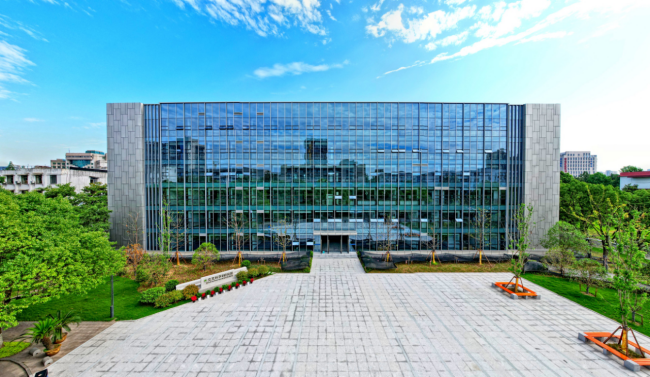Interdisciplinary Research Academy was established to meet the practical demands on serving the construction of the Health China, promoting integration of interdisciplinary sciences and providing social services for key livelihood problems. It makes full use of scientific research power in multiple fields such as environment, medicine, foods, chemistry, biology and information with the objective of ensuring health of the public, to adopt important measures in tackling difficulties with concentrated power and conduct dislocation development, to provide services to the society.
The construction of Interdisciplinary Research Academy helps eliminate barriers among traditional disciplines during the current stage, to promote combination between science and engineering, between engineering and culture, and among medicine, engineering and information, to assist with the education and cultivation of talents in the future, to meet the demands on cultivation of interdisciplinary talents during the new era due to social development. Secondly, it constructs the comprehensive platform for teaching, scientific research and social services with main orientations of environmental quality monitoring, human body health monitoring and food safety monitoring. Thirdly, it lays emphasis on key common scientific issues and common scientific technologies of disciplinary sciences, to provide comprehensive and reliable data support for construction of the Health China.
I. Positioning and Objectives of “One Academy and Two Centers”
Insisting on the operation orientation of “teaching service-oriented university”, Zhejiang Shuren University operates according to the idea of “oneacademyand two centers”.Interdisciplinary Research Academyof Zhejiang Shuren University (herein after referred to as “one academy and two centers”) is planned to be constructed as a “three-in-one” institute according to the preliminary idea. Firstly, it is planned to establish the “Public basic experiment teaching center” aiming at undergraduate teaching of related specialties in the whole university, to undertake public basic experiments of related disciplines of the whole university, to construct the interdisciplinary comprehensive public basic experiment demonstration center. Secondly, the “Interdisciplinary Research Academy” is established aiming at scientific research works of limited objectives by takingSchoolof Biological and Environmental Engineering, Shulan InternationalMedical CollegeandSchoolof InformationScienceand Technology as the main source for interdisciplinary sciences, with the main research orientation of environmental health, to construct the comprehensive scientific research platform for integration of interdisciplinary sciences. Thirdly, it establishes the “Analysis and Test Center of Zhejiang Shuren University” aiming at social services by taking environmental monitoring and food safety monitoring as main service objectives, to construct the third party analysis and test institute of Zhejiang higher education with Certificate of National Agencies of Test Qualification (CMA certification). The three parts of works are promoted, to provide better services to discipline development of the university, so as to meet demands of local livelihood.

II. Dean

Liu Weiping, a doctor, a professor, a doctoral supervisor, dean of Interdisciplinary Research Academy of Zhejiang Shuren University, a winner of National Excellent Youth Fund, a leader of the “innovative team” of Ministry of Education, an innovative group backbone of National Natural Science Fund Committee and a specially-employed professor of “Qianjiang Scholar” of Zhejiang and “Realistic Scholar” of Zhejiang University. Liu Weiping also works as director of Chinese Society of Environmental Sciences, a member of Specialized Committee of Environmental Chemistry, a member of POPs Specialized Committee, a member of Environmental Chemistry Branch of Chinese Chemical Society and director of Specialized Committee of Water Treatment Chemistry, a vice chairman of Zhejiang Society for Environmental Sciences and Zhejiang Ecological Society, and also works as a member of International Union of Pure and Applied Chemistry (IUPAC), a member of American Association for the Advancement of Science (AAAS) and a member of the International Committee of American Chemical Society (ACS). Liu Weiping graduated from Zhejiang University as a major of Chemistry in 1982 and worked for the College in the same year, and then acquired the master’s degree of Environmental Chemistry of Zhejiang University and the doctor’s degree of Applied Biochemistry of Tokyo University of Agriculture on the job. Liu Weiping studied and visited Italy, the U.S. and Japan after 1990, and works as the associate editor ofAsian Journal of EcotoxicologyandJournal of Pesticide Science, and an editorial board member of domestic journals such asChinese Journal of Environmental EngineeringandEnvironmental Chemistry, and is also an editorial board member of international academic periodicals such as Sci, Total Environ, Ecotoxicol, Environ, Safety and Chirality.
Liu Weiping is mainly engaged in research on environmental monitoring and environmental pollution and health. In recent years, he has hosted more than 20 projects such as the National Key Research “973” project, the National Hi-tech Research “863” project, the Excellent Youth Fund of National Natural Science Fund, key projects, key international cooperation projects and key scientific research instrument projects. He has issued more than 300 theses in SCI periodicals, which have been quoted for more than 18000 times (he has always been a high-frequency cited author all over the world since 2005); he has published 5 works and teaching materials; he has been awarded with 37 national invention patents; he has been awarded with three first prizes of provincial scientific and technological progress, and two second prizes and third prizes. He was awarded with the first Zhejiang Youth Science and Technology Prize in 1990, and was awarded with the title of “National Excellent Environmental Scientific Worker” by Chinese Society of Environmental Sciences in 1995; he was awarded with the Zhejiang “Excellent Member of Communist Party” and “Model Worker” in 2008 and 2009, respectively. He was selected as the fellow of American Association for the Advancement of Science of the U.S. in 2012.








